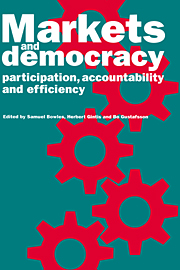Book contents
- Frontmatter
- Contents
- List of figures
- List of tables
- Preface
- 1 Post-Walrasian political economy
- Part I Agency, incentives, and democratic accountability
- 2 The democratic firm: an agency-theoretic evaluation
- 3 Alternative employment and payment systems
- Part II Institutions and institutional change
- Part III Conditions for the success of the democratic firm
- Part IV Productivity, distribution, and power
- Part V Ownership, participation and capital markets
- Part VI Political democracy and economic democracy
- Bibliography
- Author index
- Subject index
2 - The democratic firm: an agency-theoretic evaluation
Published online by Cambridge University Press: 05 March 2012
- Frontmatter
- Contents
- List of figures
- List of tables
- Preface
- 1 Post-Walrasian political economy
- Part I Agency, incentives, and democratic accountability
- 2 The democratic firm: an agency-theoretic evaluation
- 3 Alternative employment and payment systems
- Part II Institutions and institutional change
- Part III Conditions for the success of the democratic firm
- Part IV Productivity, distribution, and power
- Part V Ownership, participation and capital markets
- Part VI Political democracy and economic democracy
- Bibliography
- Author index
- Subject index
Summary
Introduction
Two fundamental reasons why firms should be owned and run democratically by their workers may be given. (1) Accountability: because the employment relationship involves the exercise of power, its governance ought on democratic grounds to be accountable to those most directly affected. (2) Efficiency: the democratic firm uses a lower level of inputs per unit of output than the analogous capitalist firm.
Neither claim is obvious. If wage labor is a voluntary exchange in a competitive market, how can it exhibit a well-defined power relationship? If the democratic firm is more efficient, what prevents the capitalist from replicating it and reaping the profits? And if capitalist firms cannot capture the efficiencies of democratic firms, why do democratic firms not simply outcompete capitalist firms? In this chapter we will substantiate these claims through a comparative analysis of a capitalist and a democratic firm facing incentive incompatibilities concerning worker effort, managerial performance, and risk-taking.
Our approach differs from much of the literature on economic democracy in two ways. First, our focus on the agency problems associated with the regulation of the intensity of labor allows us to define precisely the exercise of power of employers over workers in a competitive capitalist economy, to advance specifically democratic criteria for the evaluation of the organization of the firm, and to demonstrate the superior efficiency characteristics of the democratic firm. Neither the political nor the efficiency argument, we think, can be sustained in a framework that ignores agency problems. Indeed, the elimination of agency problems by assumption, typical of much of the literature on worker self-management, reduces the case for the democratic firm to the curious claim that it would mimic the capitalist firm.
- Type
- Chapter
- Information
- Markets and DemocracyParticipation, Accountability and Efficiency, pp. 13 - 39Publisher: Cambridge University PressPrint publication year: 1993
- 22
- Cited by



